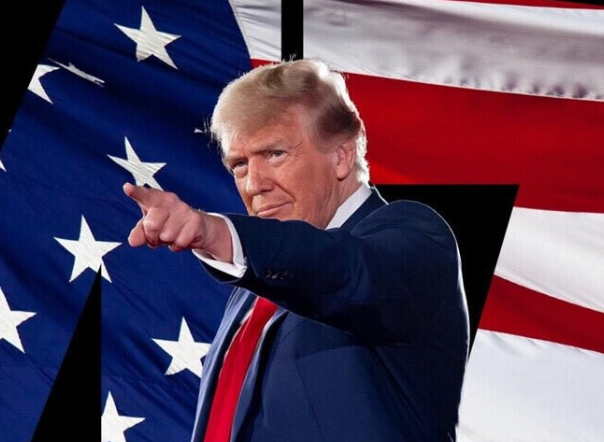U.S. markets hit fresh record highs as President Trump secured key trade deals and ramped up pressure on Fed Chair Jerome Powell to cut interest rates. This blog covers the growing clash between Trump and Powell, the controversial $3.1 billion Fed renovation, and the booming AI investment wave led by Google, Amazon, Microsoft, and Meta.
Trump Pushes for Rate Cuts
This week, U.S. markets continued their rally, hitting fresh record highs, driven by a combination of geopolitical breakthroughs and optimism around America’s technology sector. Central to this momentum was President Donald Trump’s aggressive economic playbook, which included securing a flurry of trade deals and reigniting his public clash with Federal Reserve Chairman Jerome Powell over interest rates.
As investors brace for the Federal Reserve’s interest rate decision this Wednesday, tensions between Trump and Powell have again taken center stage. The spotlight intensified after Trump visited the ongoing $3.1 billion renovation project at the Federal Reserve building, criticizing both its cost and Powell’s leadership. In a dramatic moment, Trump pulled branded notes from his pocket, challenging the renovation’s cost and accusing the Fed of unnecessary spending.
Trump didn’t mince words: “As good as we are doing, we would do better if we had lower interest rates. Without us, everything collapses. We should have the lowest interest rate.” His critique aligns with his long-standing position that Jerome Powell has failed the U.S. economy through tight monetary policy and delayed rate cuts, especially in the lead-up to previous elections.

Steve Moore, co-founder of the Committee to Unleash Prosperity, echoed Trump’s sentiment. Moore pointed out that Trump, with decades of experience in real estate and construction, was well-placed to criticize the expensive renovation project, arguing that the federal government spends taxpayer money recklessly. “This is not the thing that Americans hate about the swamp in Washington — this is the thing,” Moore remarked, emphasizing that the $3 billion price tag is outrageous given the abundance of office space in Washington, D.C.
The debate around interest rates is not just academic. Trump has made it clear that lower rates are essential to unlock the next phase of economic growth. Moore suggested that Powell’s track record doesn’t inspire confidence, calling him “an overrated Fed Chairman” who nearly pushed the economy into recession during Trump’s first term and oversaw the highest inflation in 30 years during the Biden administration. Moore also raised concerns about the timing of rate cuts ahead of previous elections, questioning whether Powell acted out of political motivation.
Amid this political-economic theater, Trump’s administration is also championing America’s rise in artificial intelligence. The President has been actively supporting policies to dominate the AI space, sparking a private sector investment boom. Alphabet recently announced it would invest $85 billion in new projects this year alone. Meanwhile, Goldman Sachs nearly doubled its 2026 projections, forecasting that major tech firms like Google, Amazon, Microsoft, and Meta will invest a combined $405 billion into AI and cloud infrastructure.
This surge is reminiscent of the 1990s internet boom. Back then, the U.S. government largely stayed away from over-regulating or taxing the web, allowing innovation to flourish. The result was the emergence of tech titans that continue to dominate today. “We did not heavily regulate or tax it in the United States, and boom — six or seven of the most amazing companies ever were born,” Moore explained. Now, with the AI revolution underway, the same deregulatory, pro-innovation approach is being echoed by Trump’s team.
Interestingly, Trump’s relationship with Big Tech — previously frosty over conservative de-platforming — has also begun to heal. Trump has recently praised companies like Google, Amazon, and Apple, signaling a renewed alliance focused on American leadership in next-gen technology. “We need to make sure we lead the way,” Moore added. “There’s no reason the U.S. cannot dominate new industries like AI, robotics, and cloud computing — just as it dominated the internet age.”
The impact of this tech-driven growth is expected to be widespread. With more than 60% of Americans participating in retirement savings plans like 401(k)s, any boost in tech stock performance directly benefits household wealth. Moore noted that tech firms such as Tesla, Nvidia, Microsoft, Amazon, and Google collectively hold more market value than all European firms combined — a sign of U.S. dominance and potential.
Adding to the optimism, Nvidia’s CEO recently declared that AI will create more millionaires in the next five years than the internet did by 2020. If this proves true, not only will Silicon Valley boom, but middle-class Americans invested in these tech giants will also see substantial financial gains.
Looking ahead, markets are preparing for a wave of tech earnings this week, including reports from Apple, Amazon, Meta, and Microsoft. These results are expected to reflect the explosive AI and cloud spending trends and could further reinforce investor confidence in America’s tech and economic trajectory.
In short, President Trump’s dual focus on economic stimulus via rate cuts and technology leadership through AI investments has created a potent narrative. As the Fed prepares to announce its decision, all eyes are on Jerome Powell — and whether he’ll respond to the mounting pressure to cut interest rates and fuel what could be America’s next major economic expansion.
Ask ChatGPT

